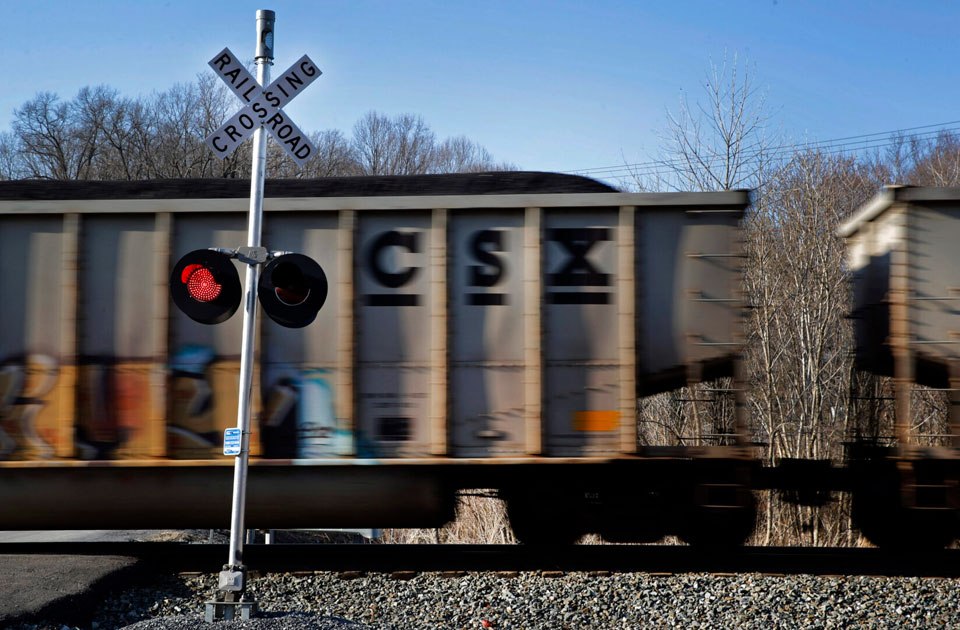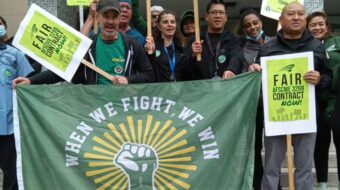
FRONT ROYAL, Va.—By a 1,820-2,810 margin, members of yet another rail union, the Brotherhood of Railroad Signalmen, rejected a proposed contract which bargainers for 13 rail unions hammered out with the nation’s Class I freight railroads, and brokered by the Democratic Biden administration.
Lack of paid sick leave was the key issue for members, union President Michael Baldwin said. It also was a key issue for another union whose members voted the pact down, the Brotherhood of Maintenance of Way Employees/Teamsters.
Talks between BMWE and the freight railroads have resumed, but with company bargainers refusing to even consider paid sick leave for the workers, news reports add.
“BRS members spoke loudly and clearly that their contributions are worth more, particularly when it comes to a basic right of being able to take time off for illness or to prevent illness,” he stated after the tally was announced October 26.
The Signalmen have just over 6,000 members while BMWE has 23,000.
The two rejections do not mean the nation’s 115,000 freight rail workers will bring the carriers to a halt. Both the unions and the carriers are in a legally mandated cooling-off period of 60 days after the tentative pact was reached on September 15, with Biden Labor Secretary Marty Walsh mediating.
After that, the freight railroads—including CSX, Norfolk Southern. Burlington Northern Santa Fe and the Union Pacific—can lock out the workers and the workers can walk. And if the proposed pact fails, Congress can step in and impose one of its own.
Would impact the supply chain
A lockout or a forced strike, just after the election, would further strain the nation’s already creaky supply chain, as the freight railroads move everything from grain to oil to coal to cars.
Like the BLE&T, members of the Signalmen bristled at carrier refusal to better work rules and working conditions—conditions, the unionists point out, that can keep them at work for weeks at a time without a break. And when they do get a day off, the bosses can call them back with little or no notice.
Both the freight railroads and a Biden-named mediation board “failed to recognize the safety-sensitive and highly stressful job BRS members perform each day to keep the railroad running and supply chain flowing,” Baldwin’s statement said.
“Without Signalmen, the roadways and railroad crossings would be unsafe for the traveling public, and they shoulder that heavy burden each day,” he added.
Railroad bosses and stockholders “seem to forget the rank-and-file of their employees continued to perform their job each day through an unprecedented pandemic, while the executives worked from home to keep their families safe.”
Railroads’ kowtowing to Wall Street demands for ever-higher profits has led to the bad working conditions and an acute shortage of rail workers ever since 2014, when cuts began, the rail union coalition notes.
Starting the next year, the big freight carriers have cut the workforce by 29% while racking up a combined $146 billion in profits.
The union’s decision sends BRS back to the bargaining table with the carriers. Under pressure from DOL, the carriers proposed larger raises, but still not enough to match inflation. But they didn’t change the work rules, and that’s angered railroaders.
“Three unions have now voted down the tentative agreement,” noted Railroad Workers United, a rank-and-file organization whose members hail from all the big freight railroads, and more, and all rail crafts.
RWU pointed out the three unions combined represent 30.4% of all rail workers. Six smaller unions, representing 19.4% of workers, have voted for the pact. The third union, Machinists District 19, negotiated its own new pact with the freight railroads, after the initial rejection. Its members are now voting on that.












Comments